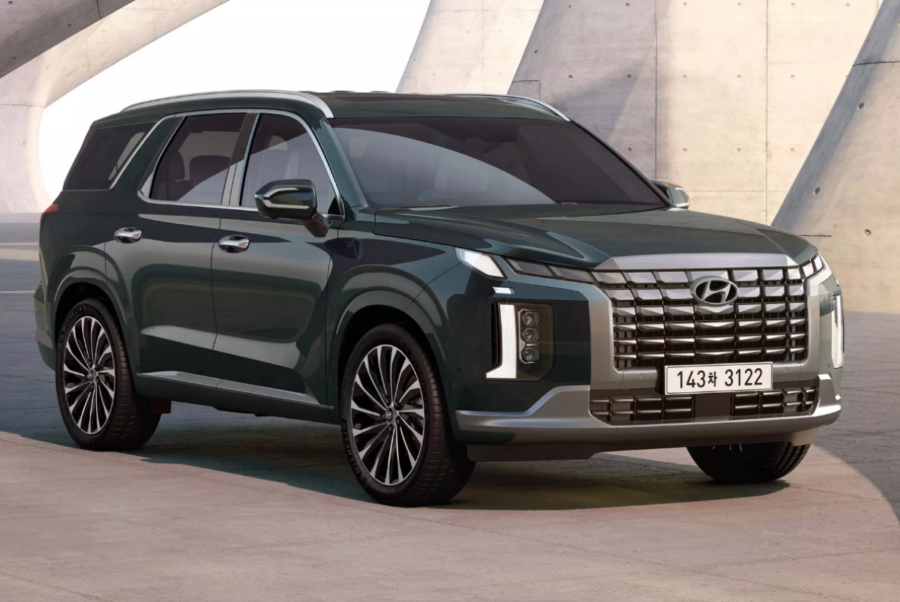When you’re maintaining your Hyundai Palisade, it’s essential to know the specifics – like the correct lug nut size for different trims, engines, and generations. Whether you’re changing a tire or rotating them, having the right lug nut size and torque specs can make a big difference in safety and efficiency.
In this guide, we’ll delve deep into the details of the Hyundai Palisade lug nut size and torque specifications for various versions of the vehicle. Bookmark this page for your next maintenance day!
Hyundai Palisade Lug Nut Sizes by Generation/Trim
| Generation/Year | Trim/Engine | Lug Nut Size |
|---|---|---|
| 2020-2022 | Base 3.8L V6 | M12 x 1.5 |
| 2020-2022 | SEL 3.8L V6 | M12 x 1.5 |
| 2020-2022 | Limited 3.8L V6 | M12 x 1.5 |
| 2023-Onwards | SE 3.8L V6 | M12 x 1.5 |
| 2023-Onwards | SEL 3.8L V6 | M12 x 1.5 |
| 2023-Onwards | XRT 3.8L V6 | M12 x 1.5 |
| 2023-Onwards | Limited 3.8L V6 | M12 x 1.5 |
| 2023-Onwards | Calligraphy 3.8L V6 | M12 x 1.5 |
Always confirm with your vehicle’s manual or consult with your local Hyundai dealership.
Lug Nut Torque Specifications
Ensuring that your lug nuts are tightened to the correct torque is crucial for both safety and the longevity of your wheels.
| Trim/Engine | Torque Spec |
|---|---|
| Base 3.8L V6 | 80-90 ft-lbs |
| SE 3.8L V6 | 80-90 ft-lbs |
| SEL 3.8L V6 | 80-90 ft-lbs |
| Limited 3.8L V6 | 80-90 ft-lbs |
| Premium 3.8L V6 | 80-90 ft-lbs |
| Elite 4.0L V6 | 90-100 ft-lbs |
| XRT 3.8L V6 | 80-90 ft-lbs |
| Calligraphy 3.8L V6 | 80-90 ft-lbs |
Tips for Ensuring Proper Lug Nut Installation:
- Use a Torque Wrench: Always use a torque wrench to ensure that you’re tightening your lug nuts to the correct specification.
- Star Pattern: Tighten lug nuts in a star pattern, rather than in a circle, for even pressure.
- Recheck After 50-100 Miles: Especially if you’ve just installed a new set of wheels, it’s a good practice to check the torque after 50-100 miles.
- Avoid Over-Tightening: Over-tightening can warp the brake rotors, leading to uneven wear and a pulsating brake pedal.
- Replace Damaged Nuts: If you notice any signs of wear or damage on your lug nuts, replace them immediately.

Common Issues with Incorrect Lug Nut Size or Torque
While it might seem trivial to some, using the incorrect lug nut size or torque for your Hyundai Palisade can lead to a plethora of issues. Here are a few common problems associated with lug nut discrepancies:
Wheel Misalignment
If the lug nuts are not tightened uniformly or to the right torque, it can result in the wheel being misaligned. Over time, this can cause uneven tire wear and an uncomfortable driving experience.
Vibration and Noise
Another noticeable effect of improperly tightened lug nuts is a persistent vibration, especially at higher speeds. Additionally, an unusual noise, resembling a clunk or rattle, might emanate from the affected wheel.
Brake Rotor Damage
Over-tightened lug nuts can lead to warped brake rotors, leading to inconsistent braking and the potential for decreased brake performance. This can make stopping distances longer and may increase the risk of an accident.
Compromised Wheel Bearing
Incorrect lug nut torque can put undue stress on the wheel bearing. Over time, this can lead to premature wear and potential failure of the bearing, necessitating an early replacement.
Safety Risks
The most critical risk with incorrect lug nut size or torque is the potential for the wheel to come off while driving. It’s a rare occurrence but can be catastrophic when it happens.
Choosing the Right Lug Nut for Your Hyundai Palisade
It’s tempting to opt for aftermarket lug nuts because of their attractive designs or affordability. However, when choosing a lug nut:
- Ensure Compatibility: Ensure they’re compatible with your Hyundai Palisade’s wheel stud size and thread.
- Check the Quality: Not all lug nuts are created equal. Prioritize quality over aesthetics.
- Understand the Types: There are different types of lug nuts like conical, spherical, and flat seat. Make sure you choose the one designed for your wheel.
The Role of the Dealership and Mechanic
While it’s empowering to be knowledgeable about your vehicle’s specifics, it’s equally essential to have a trustworthy mechanic or dealership to consult with. They can:
- Provide Verification: Dealers can verify the specifics of your vehicle, ensuring that the data matches your vehicle’s actual requirements.
- Offer Expertise: Mechanics bring their experience to the table, able to spot issues that might be missed by the average car owner.
- Supply Genuine Parts: If you’re unsure about the right lug nuts to purchase, the dealership can often provide genuine Hyundai parts that are guaranteed to fit.
